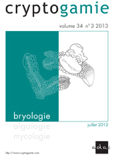
CRYPTOGAMIE BRYOLOGIE
Scope & Guideline
Pioneering Research in Plant Sciences
Introduction
Aims and Scopes
- Taxonomic Research:
The journal emphasizes taxonomic studies, including the description of new species and revisions of existing taxa, which are critical for understanding bryophyte diversity. - Ecological Studies:
Research on the ecological aspects of bryophytes, such as their roles in various ecosystems, substrate preferences, and interactions with other species, is a core focus. - Biogeographic Distribution:
The exploration of the distribution patterns of bryophytes across different geographical regions, including studies on endemic species and biodiversity hotspots. - Morphological and Molecular Analyses:
The integration of morphological and molecular approaches to provide robust data for taxonomic and ecological studies, enhancing the understanding of evolutionary relationships among bryophytes. - Conservation and Impact Assessments:
Studies that assess the conservation status of bryophyte species and their habitats, highlighting the impacts of environmental changes and human activities.
Trending and Emerging
- Molecular Phylogenetics:
There is an increasing trend in utilizing molecular techniques to resolve taxonomic questions and understand evolutionary relationships among bryophyte species. - Ecological Dynamics in Changing Environments:
Research focusing on how bryophytes respond to environmental changes, including climate change and habitat fragmentation, is becoming more prevalent, highlighting their ecological significance. - Diversity Studies in Underexplored Regions:
A growing interest in exploring bryophyte diversity in less-studied regions, such as the Amazon and Southeast Asia, is evident, which may reveal new species and enhance global biodiversity knowledge. - Conservation Genetics:
Emerging studies are integrating genetic tools to assess the conservation status of bryophytes, which is vital for informing preservation strategies in the face of habitat loss. - Interactions with Other Organisms:
Research on the symbiotic and competitive relationships between bryophytes and other organisms is gaining attention, reflecting a broader ecological perspective.
Declining or Waning
- Traditional Flora Studies:
While foundational, there has been a noticeable decrease in traditional flora checklists and inventories, possibly due to the growing emphasis on molecular techniques and ecological interactions. - Single Species Focus:
Research focusing solely on individual species without broader ecological or taxonomic context appears to be waning as researchers increasingly adopt integrative approaches. - Historical Collections Analysis:
Although valuable, studies that primarily revisit historical collections without new findings or insights seem to be less frequent, indicating a shift towards more dynamic research methods.
Similar Journals
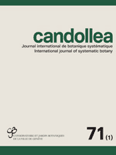
CANDOLLEA
Pioneering Research in Ecology and Plant Dynamics.CANDOLLEA is a distinguished academic journal published by the Conservatoire et Jardin Botaniques Ville Genève, focusing on the fields of Ecology, Evolution, Behavior, Systematics, and Plant Science. With an ISSN of 0373-2967, this journal serves as a vital platform for researchers, professionals, and students aiming to deepen their understanding and contribute to the scientific discourse surrounding botanical research and ecosystem dynamics. Since its convergence in 2000, CANDOLLEA has trodden the path of scholarly excellence, currently residing in the Q3 quartile for both Ecology and Plant Science in 2023. Although it does not currently offer open access, the journal plays a critical role in disseminating valuable findings and innovative methodologies that shape contemporary ecological and botanical studies. The journal is located in Switzerland at CASE POSTALE 60, CH-1292 CHAMBESY, serving as a beacon for scholars dedicated to advancing their expertise in environmental and plant sciences.
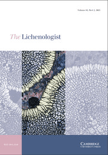
LICHENOLOGIST
Advancing Lichen Research for a Greener TomorrowLICHENOLOGIST is a prestigious journal published by Cambridge University Press, dedicated to advancing the field of lichenology and promoting a deeper understanding of the ecology, evolution, and systematics of lichens. Established in 1958 and focusing on the convergence of research through 2024, this journal has established itself as a significant resource within the Q2 category of Ecology, Evolution, Behavior and Systematics. With a Scopus ranking of #316 out of 721 in its field, it highlights research that not only enhances academic knowledge but also has practical implications for ecology and conservation efforts globally. Although traditionally not an open-access journal, it provides valuable insights and contributes to the scientific community by disseminating high-quality, peer-reviewed research. LICHENOLOGIST is essential for researchers, professionals, and students looking to stay informed about the latest advancements in lichen studies, making it an indispensable resource for anyone involved in ecological and biological sciences.
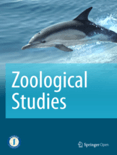
ZOOLOGICAL STUDIES
Fostering knowledge that inspires conservation efforts.Zoological Studies, published by the Biodiversity Research Center, Academia Sinica, stands as a pivotal journal in the fields of animal science and zoology. With the ISSN 1021-5506 and E-ISSN 1810-522X, this Taiwanese journal features a blend of pioneering research that spans over three decades, from 1994 to 2024, fostering a deep understanding of biodiversity and zoological phenomena. Recognized for its scholarly contributions, Zoological Studies holds an esteemed Q2 ranking in Animal Science and Zoology for 2023, positioning it among the top-tier journals in its category with a Scopus rank of #164 out of 490—reflecting its strong impact and outreach. While currently not open access, the journal aims to disseminate essential findings and discussions that advance ecological knowledge and inspire future research endeavors. Researchers, professionals, and students alike will find this journal an invaluable resource for accessing critical studies that drive innovation and conservation efforts in the field of zoology.
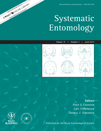
SYSTEMATIC ENTOMOLOGY
Fostering Excellence in Insect Research and MethodologySYSTEMATIC ENTOMOLOGY is a premier journal published by Wiley, specializing in the field of entomology with a particular focus on insect systematics, ecology, evolution, and behavior. With its strong academic reputation, this journal has achieved a remarkable Q1 ranking in both Ecology, Evolution, Behavior and Systematics and Insect Science categories, affirming its influence and importance in advancing research in these critical areas. SYSTEMATIC ENTOMOLOGY has a broad scope, making it a valuable source for original research, reviews, and methodological advancements that contribute to the understanding of insect biodiversity and systematics. Operating from the United Kingdom, the journal is dedicated to fostering knowledge and innovation within the scientific community, ensuring that high-quality research is accessible to researchers, professionals, and students alike. The journal's consistent publication since 1976 and its continued relevance up to 2024 exemplify its commitment to the field and its readers.

BRITTONIA
Championing Ecological Understanding in Plant StudiesBRITTONIA, published by Springer, stands as a reputable journal dedicated to advancing the fields of botany and plant sciences. With a storied history dating back to 1931, this journal has evolved to embrace contemporary research spanning various aspects of plant biology, ecology, and systematics. Focusing on a comprehensive analysis of both ecological interactions and plant systematics, BRITTONIA plays a crucial role in disseminating knowledge among researchers and professionals committed to understanding plant life and its environmental contexts. Despite its open access status being currently unavailable, the journal ensures wide accessibility through institutional subscriptions. In the latest rankings, it proudly holds a Q2 category in Plant Science and a Q3 category in Ecology, Evolution, Behavior, and Systematics, indicating its growing influence and academic rigor. Researchers and students alike will find BRITTONIA an essential resource for the latest findings and discussions in plant sciences.
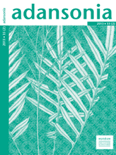
ADANSONIA
Connecting scholars for a greener tomorrow.ADANSONIA is a distinguished, peer-reviewed open access journal dedicated to advancing the field of plant science. Published by the Publications Scientifiques du Museum in Paris since 2000, this journal serves as a critical platform for sharing innovative research and discoveries in botany, ecology, and related disciplines. With its ISSN 1280-8571 and E-ISSN 1639-4798, ADANSONIA boasts a notable Scopus rank of #383 in the Agricultural and Biological Sciences category and a 2023 category quartile ranking of Q3 in Plant Science, indicating a meaningful contribution to the academic community. The journal's scope encompasses a broad range of topics, making it a vital resource for researchers, professionals, and students alike who are exploring the complexities of plant biology. Based in France, ADANSONIA not only enhances visibility for groundbreaking research but also facilitates open communication amongst scholars, ensuring that knowledge on plant science is accessible worldwide. Located at CP 39-57, Rue Cuvier, F-75231 Paris Cedex 05, France, this journal stands as a testament to the collaborative efforts in the pursuit of scientific excellence in plant sciences.
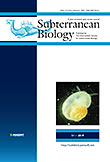
Subterranean Biology
Advancing Knowledge in Hidden Biological RealmsSubterranean Biology is a premier open-access journal published by the International Society of Subterranean Biology, dedicated to advancing knowledge in the field of subterranean ecosystems. With an impact factor that reflects its significance in the academic community, this journal has achieved a commendable ranking of Q1 in Animal Science and Zoology and Q2 in multiple categories including Ecology, Evolution, Behavior and Systematics, Nature and Landscape Conservation, and Soil Science, based on its 2023 category quartiles. Located in Bulgaria and affiliated with the Department of Animal Biology at the University of Rome, the journal has been fostering open scientific discourse and accessibility since 2011. With its ISSN 1768-1448 and E-ISSN 1314-2615, it aims to provide a platform for researchers and students to explore the complexities of subterranean life forms and their ecological implications. By publishing a wide range of research articles, reviews, and case studies, Subterranean Biology empowers its readers to delve deeper into the hidden realms of our natural world.

ORGANISMS DIVERSITY & EVOLUTION
Empowering Research: Shaping the Future of Biodiversity ScienceOrganisms Diversity & Evolution is a premier academic journal published by Springer Heidelberg, dedicated to advancing the fields of ecology, evolution, behavior, and systematics. Established in 2001 and continuing through 2024, this journal plays a crucial role in disseminating high-quality research that explores the complexities of biological diversity and evolutionary processes. With a commendable 2023 Scopus ranking of #253/721 in its category, placing it in the 64th percentile, and categorized in the Q2 quartile for Ecology and Evolution, it consistently attracts contributions from leading scientists and researchers worldwide. Although it operates on a subscription basis, the journal's rigorous peer-review process and dedication to impactful scientific discourse make it an invaluable resource for academics, practitioners, and students keen on understanding the intricate relationships that shape our biodiversity. By highlighting innovative research and fostering discussions on urgent ecological challenges, Organisms Diversity & Evolution serves as a vital platform for those committed to conservation and evolutionary biology.

Acta Botanica Brasilica
Unlocking the Secrets of Plant DiversityActa Botanica Brasilica is a prestigious open-access journal dedicated to the field of botany and plant science, published by SOC BOTANICA BRASIL. With an ISSN of 0102-3306 and E-ISSN of 1677-941X, it has been a vital resource for the academic community since its inception in 1987, fostering the dissemination of research and knowledge related to plant biology and ecology. Hailing from Brazil, the journal serves as a platform for researchers to share valuable insights on plant species, their habitats, and important ecological interactions. As of 2023, the journal holds a Q3 ranking in Plant Science and is recognized within the Scopus database, where it ranks #263 out of 516, placing it in the 49th percentile among its peers. This broad accessibility and commitment to quality research make Acta Botanica Brasilica an essential publication for botanists, ecologists, and other professionals in the life sciences, bridging gaps in knowledge and advancing the field with original articles, reviews, and comprehensive research findings.
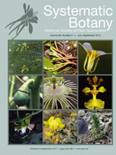
SYSTEMATIC BOTANY
Illuminating the Path of Plant EvolutionSystematic Botany, published by the American Society of Plant Taxonomists, is an esteemed journal focusing on the diverse fields of plant taxonomy, systematics, and evolution. With an ISSN of 0363-6445 and an E-ISSN of 1548-2324, this journal serves as a critical platform for researchers aiming to advance our understanding of plant biodiversity and evolutionary relationships. Operating since 1994, Systematic Botany has garnered significant recognition, achieving a Q2 ranking in Ecology, Evolution, Behavior and Systematics, and Plant Science categories, and ranking within the top half of Scopus for Genetics. The journal prioritizes publishing high-quality, peer-reviewed research, making it an essential resource for academics, practitioners, and students alike. Although it does not provide open access options, the journal's robust reputation in both American and international botanical research speaks to its pivotal role in disseminating vital scientific knowledge in the field. For those interested in the latest advancements in plant science, Systematic Botany is indispensable.